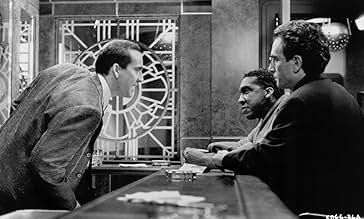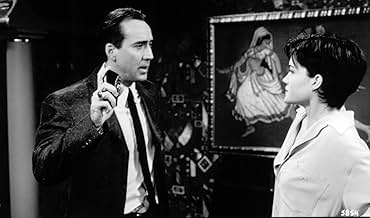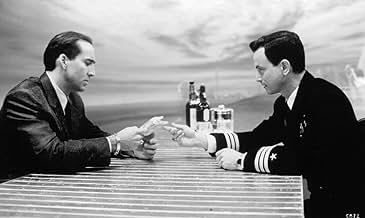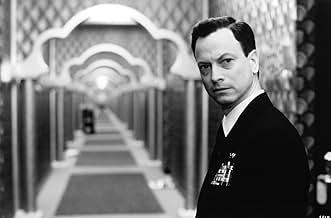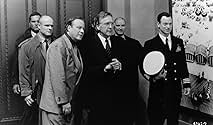AVALIAÇÃO DA IMDb
6,1/10
88 mil
SUA AVALIAÇÃO
Um policial corrupto acaba parando no meio de uma conspiração de assassinato numa importante luta de boxe no cassino de Atlantic City.Um policial corrupto acaba parando no meio de uma conspiração de assassinato numa importante luta de boxe no cassino de Atlantic City.Um policial corrupto acaba parando no meio de uma conspiração de assassinato numa importante luta de boxe no cassino de Atlantic City.
- Prêmios
- 1 vitória e 4 indicações no total
Luis Guzmán
- Cyrus
- (as Luis Guzman)
Enredo
Você sabia?
- CuriosidadesThe opening 20 minute Steadicam sequence is not really one continuous shot - there are numerous hidden edits. At least 12 minutes of the sequence was done in one take.
- Erros de gravação(at around 26 mins) When Santoro is speaking with Lincoln Tyler in his room for the first time, Lincoln says he was head-butted and there are 2 butterfly stitches on his right eye brow. When he sends everyone out of the room you can clearly see that Lincoln now has 3 butterfly stitches on his right eyebrow while talking with Santoro.
- Citações
Commander Kevin Dunne: How's Angela?
Rick Santoro: Fat, fabulous, fantastic--I love her.
Commander Kevin Dunne: How's the other one--what's her name? Candy?
Rick Santoro: Oh, Monique? Skinny, mean, expensive--I *LOVE* her!
- Cenas durante ou pós-créditosThe end credits scroll over a construction site scene (presumably the new casino), closing in tighter and tighter until the final shot is of a bright red jewel embedded in a concrete pillar that the workmen are installing. Most of the time the jewel is hidden under the hand of one of the workers. The ring was worn by the red-haired woman/Navy agent who was part of Commander Kevin Dunn's scheme.
- Trilhas sonorasFiesta Mexicana
Written and Performed by Rick Rhodes (as Rhodes), Chieli Minucci (as Minucci) & Steve Skinner (as Skinner)
Courtesy of Zomba Music Services
Avaliação em destaque
Overblown, overdirected, overacted: that's why I always enjoy DePalma's movies. He made the statement that the camera lies 24 times a second, and SNAKE EYES plays on that theme.
De Palma's camera is constantly in motion, roaming through the arena, casino , and hotel as if it had a life of its own. At the beginning of the film we watch Nick Santoro (Nicolas Cage) as he swims through the sewer (his words) that is the Atlantic City casino world. He tells us, "This isn't a beach town. It's a sewer. It's my sewer, I am the king."
It's literally a dark and stormy night. A hurricane (a tv reporter is pressured to refer to it as a 'tropical depression' on the air) is coming ashore, and 14,000 people are gathered at a casino complex to watch a prizefight.
There's a shooting during the fight, and Cage orders the exits sealed; who would go outside into a hurricane remains a mystery, but anyhow. There are two mysterious women involved in the incident, and as time passes he realizes that there were lots of people involved, possibly even his longtime friend Navy Commander Dunne (Gary Sinese) who is as straight-arrow as Cage's character is sleazy.
By the end of the story Cage is working toward redemption- even though during the early part of the film it's made clear that he sees everything as having a price.
There's one point where he is offered a million dollars to reveal where one of the women (she knows a lot- too much- about a defense contract, and was talking to the Secretary of Defense when he was shot) is hiding. And there 's a very real chance that he might give in, or be unable to protect her when the danger gets intense.
Men in De Palma's films have a way of failing to come through for women in critical situations. An executive couldn't save his wife in OBSESSION. A young actor couldn't protect a mysterious, beautiful woman in BODY DOUBLE. The nicest guy in school couldn't keep the outcast/prom queen CARRIE from humiliation and its awful consequences. In the superb BLOW OUT a movie soundman rescues a young woman from a sinking car early in the story, but is too late to save her from a madman at the film's conclusion.
So there is no guarantee of a happy ending. Self doubt weighs heavily in De Palma's films, and often people's best efforts are to no avail.
Admittedly David Koepp and De Palma's script is something of a problem. There's a complex conspiracy underfoot, and conspiracies are low on my list of compelling things- I got burned out on them in the seventies.
Far more compelling is the great fun that Cage has with his character. Boy, does he get to chew scenery here. Constantly in motion, talking on his cell phone (even during a hurricane; some of my friends can't use theirs when a cloud passes over the sun), interacting with the low life characters around the casino.
And, oh, does DePalma have fun with the whole thing. Of course, nothing is what it seems to be. He retells the action from the viewpoint of this or that character: we sometimes literally see what happened through that character's eyes. An important setpiece in which we finally see what really happened in clear perspective uses split screen imagery- and in the theatre where we saw SNAKE EYES the use of stereo sound was an integral part of the seperation of images.
For all the bravado of his performance, I was impressed with Cage's ability and willingness to share the screen with other actors. In some of the retellings he is a supporting character or featured extra, and as an actor he's more than willing to let our attention shift to someone else. A lesser actor might have been afraid of that shift of focus. Way to go, Nicolas. That's a real sign of maturity as an actor.
So did I buy into De Palma's bag of tricks? Yup, 100%. It's nice to see a movie that isn't afraid of the old razzle-dazzle. I do appreciate subtlety and complex ideas- that's why I'm a voracious reader. I really don't think I'd enjoy De Palma directing an adaptation of a Jane Austen novel or REMEMBRANCE OF THINGS PAST. The Merchant- Ivory people do that sort of thing so nicely. But it was nice to sit back for an hour and a half and let a master showman use illusion to fool us and let our eyes fool our brains.
On a five scale, Pops gives it four slot machines.
De Palma's camera is constantly in motion, roaming through the arena, casino , and hotel as if it had a life of its own. At the beginning of the film we watch Nick Santoro (Nicolas Cage) as he swims through the sewer (his words) that is the Atlantic City casino world. He tells us, "This isn't a beach town. It's a sewer. It's my sewer, I am the king."
It's literally a dark and stormy night. A hurricane (a tv reporter is pressured to refer to it as a 'tropical depression' on the air) is coming ashore, and 14,000 people are gathered at a casino complex to watch a prizefight.
There's a shooting during the fight, and Cage orders the exits sealed; who would go outside into a hurricane remains a mystery, but anyhow. There are two mysterious women involved in the incident, and as time passes he realizes that there were lots of people involved, possibly even his longtime friend Navy Commander Dunne (Gary Sinese) who is as straight-arrow as Cage's character is sleazy.
By the end of the story Cage is working toward redemption- even though during the early part of the film it's made clear that he sees everything as having a price.
There's one point where he is offered a million dollars to reveal where one of the women (she knows a lot- too much- about a defense contract, and was talking to the Secretary of Defense when he was shot) is hiding. And there 's a very real chance that he might give in, or be unable to protect her when the danger gets intense.
Men in De Palma's films have a way of failing to come through for women in critical situations. An executive couldn't save his wife in OBSESSION. A young actor couldn't protect a mysterious, beautiful woman in BODY DOUBLE. The nicest guy in school couldn't keep the outcast/prom queen CARRIE from humiliation and its awful consequences. In the superb BLOW OUT a movie soundman rescues a young woman from a sinking car early in the story, but is too late to save her from a madman at the film's conclusion.
So there is no guarantee of a happy ending. Self doubt weighs heavily in De Palma's films, and often people's best efforts are to no avail.
Admittedly David Koepp and De Palma's script is something of a problem. There's a complex conspiracy underfoot, and conspiracies are low on my list of compelling things- I got burned out on them in the seventies.
Far more compelling is the great fun that Cage has with his character. Boy, does he get to chew scenery here. Constantly in motion, talking on his cell phone (even during a hurricane; some of my friends can't use theirs when a cloud passes over the sun), interacting with the low life characters around the casino.
And, oh, does DePalma have fun with the whole thing. Of course, nothing is what it seems to be. He retells the action from the viewpoint of this or that character: we sometimes literally see what happened through that character's eyes. An important setpiece in which we finally see what really happened in clear perspective uses split screen imagery- and in the theatre where we saw SNAKE EYES the use of stereo sound was an integral part of the seperation of images.
For all the bravado of his performance, I was impressed with Cage's ability and willingness to share the screen with other actors. In some of the retellings he is a supporting character or featured extra, and as an actor he's more than willing to let our attention shift to someone else. A lesser actor might have been afraid of that shift of focus. Way to go, Nicolas. That's a real sign of maturity as an actor.
So did I buy into De Palma's bag of tricks? Yup, 100%. It's nice to see a movie that isn't afraid of the old razzle-dazzle. I do appreciate subtlety and complex ideas- that's why I'm a voracious reader. I really don't think I'd enjoy De Palma directing an adaptation of a Jane Austen novel or REMEMBRANCE OF THINGS PAST. The Merchant- Ivory people do that sort of thing so nicely. But it was nice to sit back for an hour and a half and let a master showman use illusion to fool us and let our eyes fool our brains.
On a five scale, Pops gives it four slot machines.
- bababear
- 19 de ago. de 1998
- Link permanente
Principais escolhas
Faça login para avaliar e ver a lista de recomendações personalizadas
- How long is Snake Eyes?Fornecido pela Alexa
Detalhes
Bilheteria
- Orçamento
- US$ 73.000.000 (estimativa)
- Faturamento bruto nos EUA e Canadá
- US$ 55.591.409
- Fim de semana de estreia nos EUA e Canadá
- US$ 16.310.373
- 9 de ago. de 1998
- Faturamento bruto mundial
- US$ 103.891.409
- Tempo de duração1 hora 38 minutos
- Cor
- Mixagem de som
- Proporção
- 2.39 : 1
Contribua para esta página
Sugerir uma alteração ou adicionar conteúdo ausente



